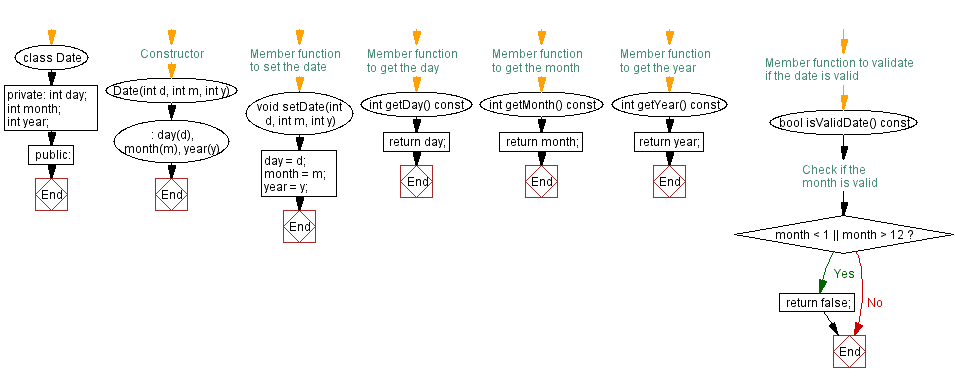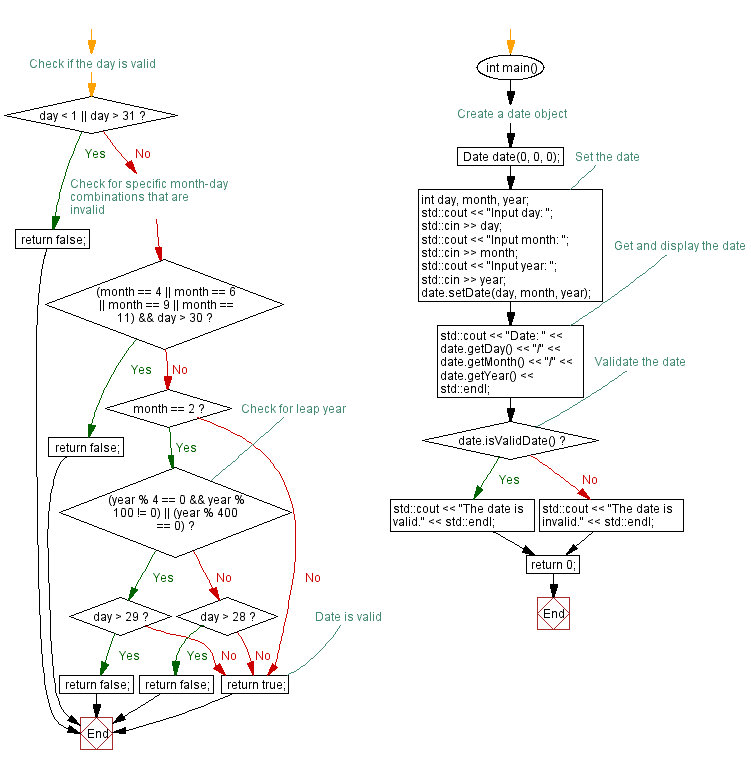C++ Object-Oriented Programming: Date validation and management
8. Date Class with Validation
Write a C++ program to implement a class called Date that has private member variables for day, month, and year. Include member functions to set and get these variables, as well as to validate if the date is valid.
Sample Solution:
C Code:
#include <iostream> // Include necessary header for input/output stream
class Date { // Define a class named Date
private:
int day; // Private member variable to store the day
int month; // Private member variable to store the month
int year; // Private member variable to store the year
public:
// Constructor to initialize Date object with provided day, month, and year
Date(int d, int m, int y): day(d), month(m), year(y) {}
// Member function to set the date
void setDate(int d, int m, int y) {
day = d; // Set day
month = m; // Set month
year = y; // Set year
}
// Member function to get the day
int getDay() const {
return day; // Return day
}
// Member function to get the month
int getMonth() const {
return month; // Return month
}
// Member function to get the year
int getYear() const {
return year; // Return year
}
// Member function to validate if the date is valid
bool isValidDate() const {
// Check if the month is valid
if (month < 1 || month > 12)
return false;
// Check if the day is valid
if (day < 1 || day > 31)
return false;
// Check for specific month-day combinations that are invalid
if ((month == 4 || month == 6 || month == 9 || month == 11) && day > 30)
return false;
if (month == 2) {
// Check for leap year
if ((year % 4 == 0 && year % 100 != 0) || (year % 400 == 0)) {
if (day > 29)
return false;
} else {
if (day > 28)
return false;
}
}
// Date is valid
return true;
}
};
int main() {
// Create a date object
Date date(0, 0, 0); // Initialize Date object with default values
// Set the date
int day, month, year; // Define variables to store day, month, and year
std::cout << "Input day: "; // Prompt user to input day
std::cin >> day; // Input for day
std::cout << "Input month: "; // Prompt user to input month
std::cin >> month; // Input for month
std::cout << "Input year: "; // Prompt user to input year
std::cin >> year; // Input for year
date.setDate(day, month, year); // Set Date object with provided values
// Get and display the date
std::cout << "Date: " << date.getDay() << "/" << date.getMonth() << "/" << date.getYear() << std::endl; // Output date
// Validate the date
if (date.isValidDate())
std::cout << "The date is valid." << std::endl; // Output for a valid date
else
std::cout << "The date is invalid." << std::endl; // Output for an invalid date
return 0; // Return 0 to indicate successful completion
}
Sample Output:
Input day: 01 Input month: 01 Input year: 2000 Date: 1/1/2000 The date is valid.
Input day: 29 Input month: 02 Input year: 2017 Date: 29/2/2017 The date is invalid.
Input day: 31 Input month: 6 Input year: 2019 Date: 31/6/2019 The date is invalid.
Explanation:
In the above exercise,
- The Date class is defined with private member variables day, month, and year representing the day, month, and year of the date.
- The constructor Date initializes the day, month, and year member variables.
- The member function setDate sets the values of the day, month, and year member variables.
- The member functions getDay, getMonth, and getYear are implemented to retrieve the values of the respective member variables.
- The member function isValidDate validates if the date is valid. It performs various checks to ensure that the day, month, and year values fall within valid ranges and that the specific month.
Flowchart:


For more Practice: Solve these Related Problems:
- Write a C++ program to implement a Date class with private members for day, month, and year, and include member functions to validate the date and print it in a standard format.
- Write a C++ program to create a Date class that validates date input (considering leap years) and overloads the input and output stream operators.
- Write a C++ program to design a Date class with a member function to determine the day of the week for the given date after validation.
- Write a C++ program to implement a Date class that checks if the entered date is valid and then calculates the number of days from a fixed reference date.
Go to:
PREV : Employee Class with Salary Based on Performance.
NEXT : Student Class with Grade Calculation.
CPP Code Editor:
Contribute your code and comments through Disqus.
What is the difficulty level of this exercise?
